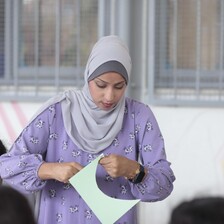The Electronic Intifada 13 November 2023

Huge numbers of children are being killed and wounded in Gaza.
APA imagesGaza’s children are living through a horror movie during the day and a nightmare after dark.
Gaza’s children did not choose this situation. It was imposed on them by Israel.
Gaza’s children did not choose death.
They have big dreams that they think about every day. They believe that their parents are superheroes who can make those dreams come true.
Their parents have told the children that dreams can be realized when they grow up.
But the reality – a reality imposed by Israel – is that so many children in Gaza do not grow up. They are killed before they can grow up.
The children of Gaza are experiencing the worst days of their lives. They know that Israeli warplanes are targeting them.
It is by no means the first time that children have been targeted. Children comprised a large proportion of Gaza’s martyrs during a major Israeli attack in May 2021.
But the intensity of the current war is unprecedented.
The number of children confirmed to have been killed is now approaching 5,000. As Gaza’s hospitals are being attacked and forced to close and the health ministry is unable to update casualty data – and huge numbers are trapped under rubble – the real figure for child deaths is far higher.
“Terror every day”
Some of those killed were newborn babies.
Is killing childhood in Gaza really the goal of Israel’s war?
Israel is displaying its inhumanity by robbing children of their right to live in peace.
Children fear the sound of missiles and explosions.
They are exhausted because they are deprived of sleep and rest.
They have to move with their parents from one place to another.
They hope to find safety. But there is none.
Sarah al-Saadi is aged 14. “This is not a war,” she said. “This is the extermination of children. How can the world look at the scenes of children under the rubble as if it is something normal?”
“No one feels for us,” she added. “I have not heard anyone saying, ‘Stop the war for the sake of Gaza.’ We live in terror every day. We are afraid of the sounds of missiles and the sounds of tank shells. They never stop.”
Sarah and her family have taken shelter in a school run by the UN agency for Palestine refugees (UNRWA). They went there, she said, “to escape death.”
“We walked for a long distance under bombardment. They [the Israelis] showed no mercy or pity to the children.”
Sarah has talked to other children at the UNRWA school about her experiences.
“We all need to speak and be heard,” she said. “This is a very scary world. We are children. And like the other children of the world, we have the right to learn, the right to play and the right to live in peace.”
Is death approaching?
Many children have written their names on their hands and feet. They have done so to ensure that if they die, they will not die anonymously.
They will not be numbers.
Many children cried before writing their names. They felt that death was approaching them.
“I saw many videos of children who were torn to pieces,” said Reem Salama, 10. “Nobody knew who they were. I saw pictures of children writing their names on their hands. That’s why I sat in the schoolyard and wrote my name on my hands and feet. Other children came around and I wrote their names for them. I felt sad but this is life in Gaza.”
“Instead of learning, playing, watching TV, spending time at home, we are writing our names on our bodies,” she added. “We are afraid that we will die without anyone knowing about us.”
Adults are struggling to offer children comfort as Israel’s bombardment continues.
Khaleda Zakaria, 45, said, “This is a war against children. I cried so hard when I saw children writing their names on their hands and feet. Some of them asked me, ‘Does this mean we are going to die?’. I told them, ‘No, this is just a game.’”
Zakaria notes that problems associated with trauma – such as bed-wetting at night and trembling during the day – are widespread.
“The sounds of missiles frighten them a lot,” she said. “They experience fear and anxiety all the time. If a missile falls next to us, they cannot sleep at all during the night out of fear that someone will target them. I have five children and they are all living through the same terrible experience. I just wish the war would end and I often pray for that.”
Children are unable to attend classes and routines that give their lives some stability have collapsed.
“I used to complain about how I had to wake up early for school,” said Ahmad Abu al-Rous, 13. “I couldn’t wait until the weekend or until we had vacations. Now, I hope that school will start again. I miss my friends.”
“I miss my grandfather and my grandmother and other relatives,” he said. “I miss my home. We had to leave it because of the bombing. I am tired of sleeping in classrooms and searching for water for my family. I am tired of the sound of missiles. I am tired of everywhere being crowded. I hope the war stops. I hope that the world hears our voices.”
Ruwaida Amer is a journalist based in Gaza.




